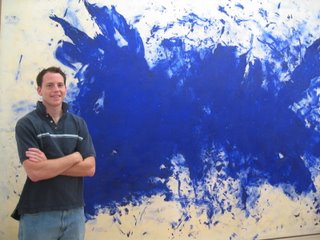In the following 50 lines I'll explain (and then refute) the purpose of life, as I see it.
As one who tries to base his beliefs on evidence, I cannot *yet* accept the faith-fueled hypotheses that life exists for any profound intentions such as those that would be appointed to it by a supernatural force. Thus, aside from life's obvious proximate objective, to perpetuate itself, I can think of only one other objective that the biochemical process of life aspires to, and it is also a proximate objective.
In three words, it is this: to oppose entropy.
So that my rhetorical explanation will be as lucid as possible, I'll display it as numbered points:
(1) The total entropy (disorder) of the universe increases according to the second law of thermodynamics.
(2) Events which create entropy are driven to occur spontaneously (e.g. gasses expand, large molecules combust and splinter into smaller ones, buildings crumble, stars burst in supernovae).
(3) A life-form is constructed through a large number of highly ordered biological processes (e.g. a life-form is created when DNA begets RNA, which produces proteins that constitute cells).
(4) A life-form endeavors to bring order into the system around it (large molecules are made in cells, muscles allow the construction buildings, nerves - the authorship of books and the chemical transmutation of ore to iron).
(5) Life removes entropy from the universe, Quod Erat Demonstrandum.
Convinced? You shouldn't be. Now that I've built a case for entropy feeding life with a purpose, permit me to rip the very foundation of that argument to shreds.
Ask yourself: Do the achievements of life forms actually slow the increase in the total entropy of the universe? The very processes of respiration which endow biological entities with the energy to "create order" (which I defined as anything from the synthesis of complex molecules to the construction of tall buildings) themselves contribute entropy. In the case of flora, energy derived in photosynthesis emanates from fusion processes on the star, which also contribute to the increase in entropy of the universe.
Also, I'm also way off base using the term 'entropy' to describe macroscopic phenomenon. The second law of thermodynamics refers to entropy only as an increase in the number of accessed microstates for an individual molecule*, not a decline in the order of aggregates of material that could be found in building collapses or supernovae. So the whole argument is bunkum anyway.
 From what we can see of the vast immutable space that constitutes the universe outside of this small, life-containing bubble, it seems that life has not constituted (and will not constitute) more than a modicum of influence on the events inside of it. In light of this understanding, it seems that propositions of any ultimate purposes for life itself are necessarily fruitless, silly undertakings. I promise to refrain from here out, and address much more specific dialectics.
From what we can see of the vast immutable space that constitutes the universe outside of this small, life-containing bubble, it seems that life has not constituted (and will not constitute) more than a modicum of influence on the events inside of it. In light of this understanding, it seems that propositions of any ultimate purposes for life itself are necessarily fruitless, silly undertakings. I promise to refrain from here out, and address much more specific dialectics.


